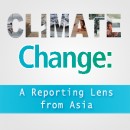Languages

Tuesday, August 6, 2013
Journalism and Communication for Global Change
Energy

New York Wants Your Potato Peels
Ask a random New Yorker what their city is famous for and “composting” is about as likely to make the list as “cheap housing” and “warm winters”. But if it is up to Mayor Michael Bloomberg, this will soon change.
Alberta’s Oil Sands Bring Jobs, Services and Despair
“First the bugs began to disappear,” says Eriel Deranger, spokesperson for Athabasca Chipewyan First Nation.
Geothermal Energy Stuck in a Hole in Switzerland
An accident in a flagship project threatens the future of geothermal energy in Switzerland. The mishap that was followed by earthquakes has come as a warning that geothermal deep drilling still has a long way to go.Ex-Envoy’s Account Clarifies Iran’s 2003 Nuclear Decision
Newly published recollections by the former French ambassador to Iran suggest that Iran was not running a covert nuclear weapons programme that it then decided to halt in late 2003, as concluded by U.S. intelligence in 2007.
Biochar Could “Turn Back Clock” on Climate
Even as policymakers around the world wrestle with how to cut future emissions of global greenhouse gases, some scientists and environmentalists are increasingly turning their attention to the carbon dioxide that is already in the atmosphere, trying to discern ways that this level can be efficiently and safely brought down.
Poland’s Shale Gas Bubble ‘Bursting’
Since Jun. 3, inhabitants of the village Zurawlow in Grabowiec district in southeastern Poland have been occupying a field in their locality where the U.S. company Chevron plans to drill for shale gas. The farmers’ resistance is just the latest blow to shale gas proponents in the country.
U.S., U.K. Accused of Ignoring, Facilitating Abuses in Ethiopia
The U.S. and U.K. foreign assistance offices are being accused of ignoring, mischaracterising or downplaying testimony offered by ethnic communities in Ethiopia who accuse the Addis Ababa government of forcefully evicting them from their lands and violating their human rights in the name of mass development projects.
Caribbean Launches New Tool to Deal with Climate Change
If the studies conducted by the International Code Council (ICC) are true, then by 2025, Caribbean countries will witness a significant increase in Category 4 and 5 hurricanes from the present level of 1.4 annually to four.
Q&A: Will the Iranian Nuclear Conflict Change With Rouhani?
The Jun. 14 election of Hassan Rouhani, nicknamed the "diplomatic sheik" during his service as Iran's chief nuclear negotiator from 2003-2005, to Iran's presidency was met with hopeful celebrations within the country but much cooler reactions from key world leaders.
EU Bank ‘Funding Polluters’
The European Investment Bank, the largest institutional bank in the world, is facing criticism for its funding of fossil fuel projects and for weaker standards for lending to coal plants than currently proposed in both the U.S. and Canada.
Biofuels Get a Dubious Boost
In an unexpected move, European parliamentarians have approved a new biofuel regulation that will take emissions from indirect land use change into account. The new text allows the biofuel sector to expand, sending a clear signal to world food markets and jeopardising food security for the world's poorest.
Climate Change Takes Centre Stage in U.S.-China Talks
The United States and China have agreed on a suite of potentially far-reaching initiatives aimed at cutting greenhouse gas emissions in the world’s two largest economies and largest polluters.
Over a Barrel, Caribbean Seeks Finance for Clean Energy
When James Husbands, a 24-year-old Barbadian businessman, began weighing the possibility of manufacturing solar water heaters, there was already a prototype on the island that had been designed and installed by an Anglican priest living there in the early 1970s.
U.S. Navy’s “Green Fleet” Sparks Praise and Cynicism
The United States military, an organisation that consumes 90 percent of the country's federal oil allowance, is trying to become a greener institution.
U.S. Court Overturns Key Extractives Transparency Rule
A federal judge here on Tuesday struck down a key new regulatory provision that would require large U.S.-listed extractives companies to disclose payments made to foreign governments, a rule that rights groups had long pushed as a way to cut down on corruption in developing countries.Next Page »
























IPS on Facebook